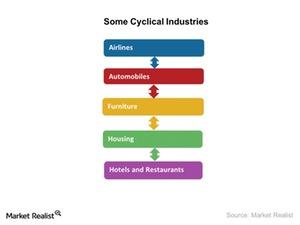Will the Cyclical Sector Outperform the Defensive Sector?
The cyclical sector has a sizeable correlation with the different phases of the business cycle.
Aug. 17 2016, Updated 9:08 a.m. ET

Bill Miller’s view on the cyclical sector
When asked about his investment strategy for the next five years in a Wall Street Week interview, Bill Miller said that he is investing in the cyclical sector in this current investment scenario and expecting that it will provide a good return in the next business cycle. He also said that he is avoiding the defensive sector, as it looks overpriced.
Cyclical investment
The cyclical sector has a sizeable correlation with the different phases of the business cycle. The defensive sector has little correlation with the business cycle, so it is also known as a non-cyclical sector. Making an investment in the defensive sector means taking a position in the utilities, healthcare, telecommunications, and consumer staples sectors. The Utilities Select Sector SPDR ETF (XLU), the Health Care Select Sector SPDR ETF (XLV), and the Consumer Staples Select Sector SPDR ETF (XLP) have exposure to defensive stocks. According to Bill Miller, these sectors are very pricey.
When the business cycle starts to recover, we see expansion in economic activity. The corporate earnings also pick up at that time, and fund managers shift their investment towards the cyclical sector. Bill Miller believes the business cycle will pick up in the upcoming years, and cyclical stocks will perform better than the defensive stocks. He also believes that the cyclical stocks are very cheap as compared to defensive stocks.
Bill Miller has made his big investments in the airlines, housing, financial (XLF), and the technology (XLK) sector. Stocks such as American Airlines Group (AAL), Southwest Airlines (LUV), Marriott International (MAR), and General Motors (GM) are good examples of cyclical stocks.
In the next part of this series, we will analyze why Bill Miller prefers Amazon over Facebook and Google.
